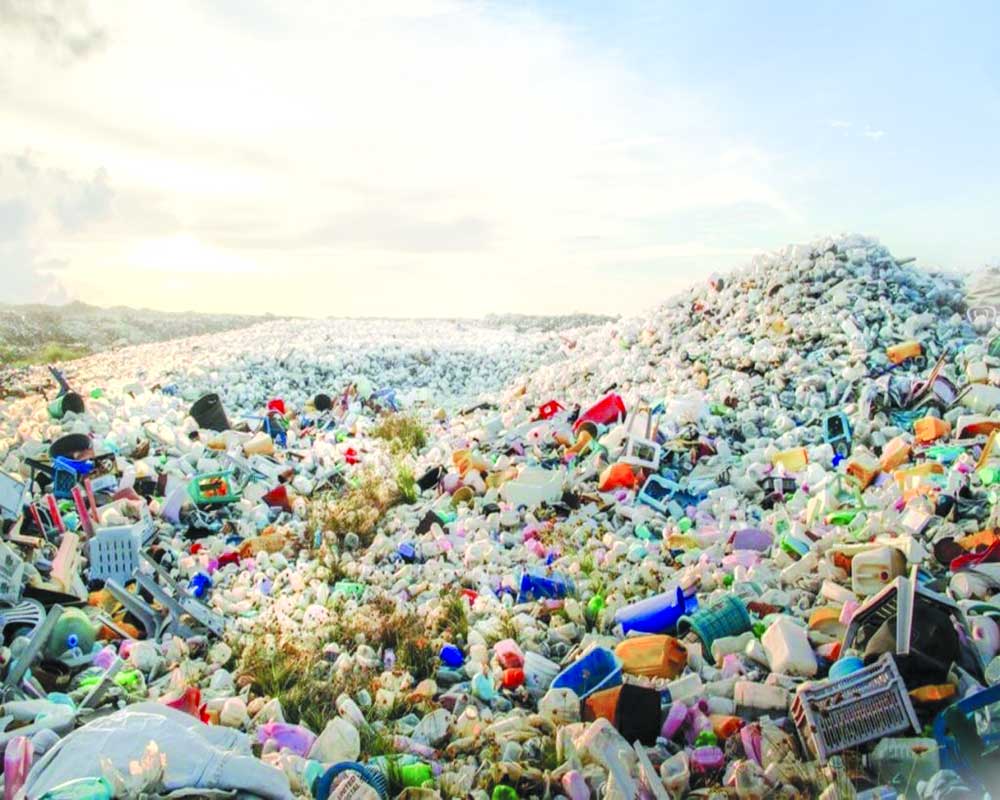India is fast emerging as global dumping ground for plastic waste. More than 25 countries, including neighbouring countries like Pakistan and Bangladesh, have dumped 1,21,000 metric tonne of plastic rubbish here after recycling companies “slyly” imported the same. It has happened even as India is unable to tackle its own plastic waste crisis, which prompted the ban on the import of plastic waste.
According to Pandit Deendayal Upadhyay Smriti Manch (PDUSM), an NGO affiliated with the Union Environment Ministry, the quantity of plastic waste import to Maharashtra was 19,375 metric tonnes, Gujarat 18,330 MT and Tamil Nadu 10,689 MT.
Based on a study conducted between April 2018 and February 2019, the report said 55,000 metric tonne of plastic waste was imported in India from Pakistan and Bangladesh for recycling purposes. More than 25 countries, including those from the West Asia, Europe and the US, are involved in the dumping the environmental hazard waste in India.
More than 19,517 metric tonne of plastic waste was imported in Delhi, the second highest quantity of waste import after Uttar Pradesh which got 28,846 metric tonne of plastic waste.
“Recyclers are importing plastic flakes and lumps, since it is cheaper compared to collecting and recycling locally produced waste,” the report said.
The Government had banned the import of plastic waste, particularly PET bottles in 2015 to incentivise domestic plastic recycling units. In 2016, an amendment allowed such imports as long as they were carried out by agencies situated in Special Economic Zones. It’s this loophole that has been exploited, said environmental experts.
At present, India produces nearly 26,000 tonnes of its own plastic waste every day, according to the Central Pollution Control Board (CPCB). But at least 40 per cent of the waste remains uncollected due to lack of optimum recycling facilities, so it ends up in incinerators or landfills instead, thereby contaminating the natural environment.
The growing import is a huge burden at home. Expressing concern over the trend, PDUSM president Vinod Shukla said it may hamper the efforts to control plastic pollution.
“If recyclers are not stopped from importing recycled waste, then how will we encourage recycling industry to collect and recycle locally produced waste. The import is affecting Government’s efforts in curtailing plastic pollution and also doing a disservice to our environment. The NGO demands import ban on plastic flakes and lumps, made from washing and cutting plastic waste,” Shukla said.
“This practice is also proving to be counter-productive to Government’s efforts in strengthening the collection and recycling of plastic waste in our country. The Minister of Environment has announced the Government’s plans to ban plastic scrap import by August 2019. We also urge him to ban the import of plastic flakes and lumps, made from plastic waste. Currently, the flakes and lumps are being imported through sea, air and road,” the NGO said.
It said globally, PET (petroleum coke) is the most recycled plastic and the current rate of PET bottles recycling in India is around 80 per cent. “If the plastic flakes and lumps import is stopped, it will compel the importers and recycling companies to procure the raw material (plastic waste) locally for manufacturing polyester/textile fiber, sheets, straps and other products, which will help in increasing the collection and recycling rate of used PET bottles up to 99 per cent and also ensure job security for 40 lakh ragpickers,” the report said.
Indian Pollution Control Association (IPCA) Chairman Ashish Jain said the reason why such a practice was prevalent was that plastic imported by the companies from abroad was segregated and cheaper than the plastic waste produced in India while. Gaurav Bansal, advocate and environment activist demanded the Government to step in to fix responsibility.


























